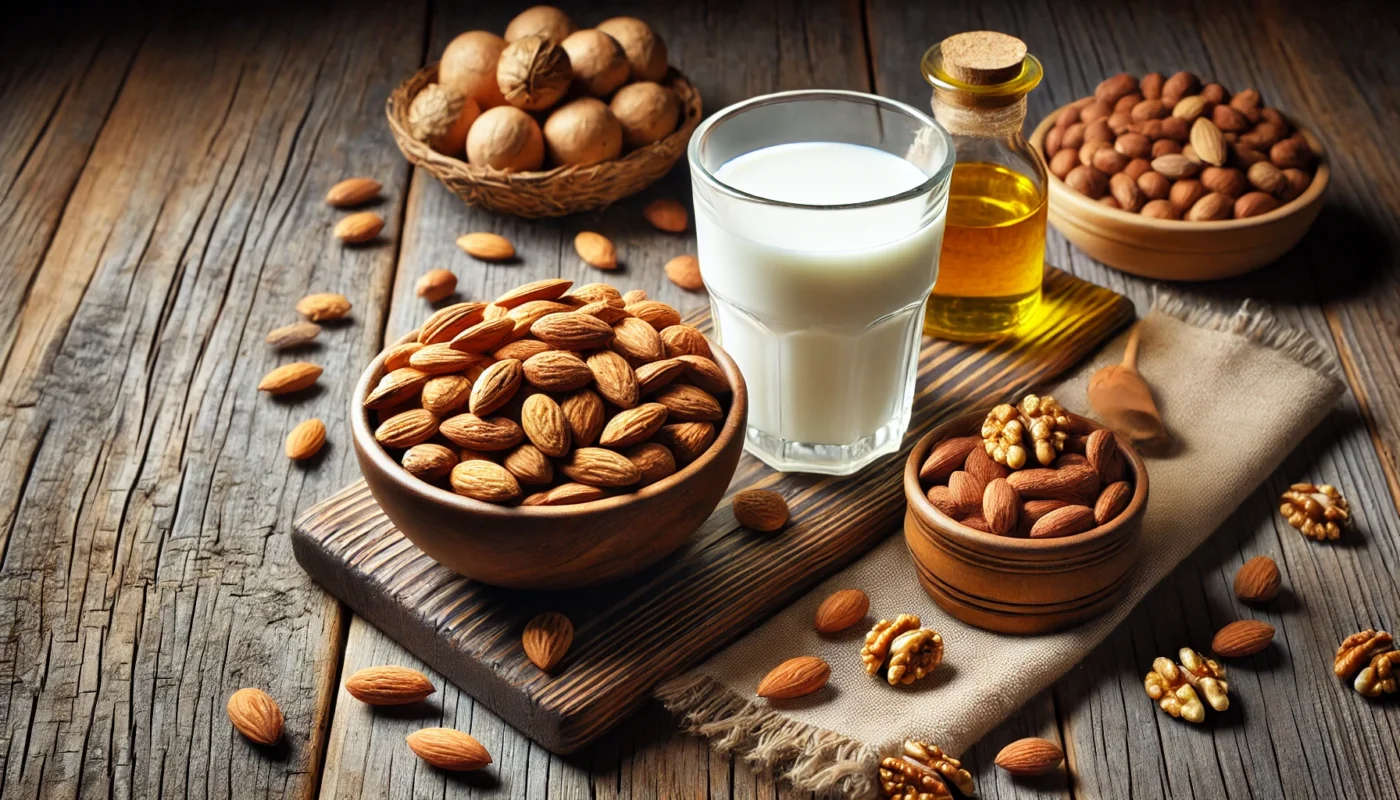Gut inflammation is a common health concern. It can cause discomfort, disrupt your daily life, and even lead to serious health issues.
Understanding the role of vitamins in managing gut inflammation can be a game-changer. It can help you take control of your health and improve your quality of life.
This article aims to shed light on the essential vitamins that can help combat gut inflammation. We will delve into the science behind these vitamins, their benefits, and how to incorporate them into your diet.
We will also explore other supplements that can support gut health and reduce inflammation. These include probiotics, prebiotics, and certain minerals and herbal supplements.
In addition, we will provide practical tips on how to choose high-quality supplements. We will also discuss the importance of personalized nutrition and lifestyle factors that can influence gut health.
Whether you’re a fitness enthusiast, a health enthusiast, or a medical patient, this article is designed to provide you with comprehensive and practical information.
Our goal is to empower you to make informed decisions about your health. Let’s embark on this journey towards improved gut health and overall wellbeing.
You May Also Like: Natural NSAIDs: Benefits and Side Effects
Understanding Gut Inflammation and Its Impact on Health
Gut inflammation is an immune response to perceived threats in the digestive tract. Such inflammation can be acute or chronic, often leading to uncomfortable symptoms.
Common symptoms include bloating, pain, and irregular bowel movements. Over time, persistent inflammation may result in more significant health issues, such as malabsorption of nutrients.
Inflammatory Bowel Disease (IBD) is a prime example of chronic gut inflammation. It includes conditions like Crohn’s disease and ulcerative colitis, impacting millions globally.
The gut microbiome plays a critical role in maintaining gut health. This community of microorganisms helps digest food, absorb nutrients, and modulate immune responses.
A balanced microbiome supports intestinal health and reduces inflammation. Imbalance, however, may lead to increased gut permeability, often referred to as “leaky gut.”
Addressing gut inflammation involves looking at lifestyle changes. Key strategies include dietary adjustments, stress management, and the use of targeted supplements.
- Common symptoms: bloating, pain, irregular bowel movements
- Health issue from chronic inflammation: malabsorption
- Role of gut microbiome: digestion, nutrient absorption, immune modulation
Understanding the intricate relationship between diet, lifestyle, and gut health is crucial. With the right knowledge, managing gut inflammation effectively becomes achievable.
The Role of Diet in Managing Gut Inflammation
Diet is a fundamental aspect of managing gut inflammation. The foods you consume can either exacerbate or alleviate symptoms.
Anti-inflammatory foods, such as fruits, vegetables, and whole grains, promote gut health. They provide essential nutrients and fiber, fostering a healthy microbiome.
Conversely, processed foods, high in sugars and unhealthy fats, can aggravate inflammation. Eliminating or reducing these foods can significantly improve gut health over time.
How Vitamins and Supplements Support Gut Health
Vitamins and supplements can offer additional support for gut health. They work by bolstering the body’s natural defenses and reducing inflammation.
Vitamin D, for instance, regulates the immune system. It helps maintain a healthy balance in the gut environment.
Other vital vitamins, such as A and E, contribute to the integrity of the gut lining. They also possess anti-inflammatory properties, enhancing overall gut function.
When choosing supplements, quality matters. Opting for well-researched, high-quality products ensures you receive the most benefit for your gut health needs.

Key Vitamins for Reducing Gut Inflammation
Vitamins play a crucial role in reducing gut inflammation. They support immune health, repair tissues, and aid digestion.
Incorporating key vitamins into your routine can help soothe inflammation. These vitamins work synergistically to protect and nourish the gut.
Vitamin A: The Gut Lining Guardian
Vitamin A is vital for maintaining the gut lining’s integrity. It helps produce mucosal barriers that prevent harmful substances from entering the bloodstream.
This vitamin also supports the immune system, enhancing the body’s ability to manage inflammation. Foods rich in Vitamin A include carrots, sweet potatoes, and spinach.
Deficiency in Vitamin A can lead to a weakened gut barrier. Ensuring adequate intake can help maintain a robust, healthy digestive system.
Vitamin D: The Immune System Regulator
Vitamin D is known for its role in bone health, but it also regulates the immune system. Adequate levels of Vitamin D help modulate inflammatory responses in the gut.
Research suggests that Vitamin D deficiency is linked with increased gut inflammation. Ensuring sufficient sun exposure or supplementation can be beneficial.
Additionally, Vitamin D supports the growth of beneficial gut bacteria. This promotes a balanced microbiome and further reduces inflammation risks.
Vitamin E: The Antioxidant Powerhouse
Vitamin E is a potent antioxidant that protects cells from oxidative stress. It neutralizes free radicals, which can exacerbate inflammation in the gut.
Besides its antioxidant properties, Vitamin E supports the immune system. It aids in wound healing and tissue repair, crucial for maintaining gut health.
Sources of Vitamin E include nuts, seeds, and green leafy vegetables. Including these foods in your diet can bolster your gut’s defenses.
Vitamin C: The Inflammation Fighter
Vitamin C is essential for its antioxidant and anti-inflammatory properties. It helps reduce oxidative stress that can lead to gut inflammation.
This vitamin also strengthens the immune system, aiding in the body’s defense against infections and inflammation. Citrus fruits and vegetables like bell peppers are excellent sources.
Vitamin C supports collagen production, vital for gut lining repair. Regular intake can help prevent and alleviate gut inflammation.
B Vitamins: The Energy and Repair Contributors
B Vitamins, including B6, B12, and folate, are fundamental for energy production and cell repair. They assist in DNA synthesis and repair, maintaining a healthy gut lining.
These vitamins are crucial for converting food into energy, supporting metabolism and digestive health. Leafy greens, beans, and whole grains are rich sources of B Vitamins.
Deficiencies in B Vitamins can lead to increased inflammation and gut permeability. Ensuring an adequate intake helps bolster gut health and supports overall wellness.
Additional Supplements for Gut Health and Inflammation
Supplements can significantly aid in managing gut inflammation. They enhance the effectiveness of a balanced diet and healthy lifestyle.
Including supplements like omega-3 fatty acids, probiotics, and herbal remedies can help soothe inflammation. These support the gut’s overall health and resilience.
Omega-3 Fatty Acids: Anti-Inflammatory Agents
Omega-3 fatty acids are renowned for their anti-inflammatory properties. They play a crucial role in reducing inflammation throughout the body, including the gut.
These essential fats, found in fish oils and flaxseeds, reduce inflammatory markers in the digestive system. Incorporating them into your diet can help alleviate inflammation-associated discomfort.
Regular intake of omega-3 fatty acids supports a balanced immune response. They help maintain healthy cell membranes, contributing to overall gut integrity and health.
Probiotics and Prebiotics: The Microbiome Enhancers
Probiotics introduce beneficial bacteria to the digestive system. These microbes support a balanced gut environment, reducing inflammation.
Prebiotics, often found in fiber-rich foods, feed these good bacteria. They encourage the growth of beneficial microbes, enhancing the gut’s health and resilience.
Together, probiotics and prebiotics create a harmonious microbiome. This reduces the risk of gut-related disorders and fosters better digestion and nutrient absorption.
Zinc: The Immune Function Ally
Zinc is critical for a healthy immune system and overall gut function. This mineral helps repair cells and tissues, contributing to a robust gut lining.
Adequate zinc levels support immune defenses, reducing inflammatory responses. Foods like oysters, beef, and pumpkin seeds can boost zinc intake.
Moreover, zinc plays a role in enzyme production, crucial for digestion and nutrient absorption. It ensures efficient metabolic processes, promoting digestive health.
Herbal Supplements: Natural Inflammation Remedies
Herbal supplements offer a natural approach to managing gut inflammation. Many herbs, such as turmeric and ginger, possess anti-inflammatory properties.
Curcumin, the active compound in turmeric, is particularly effective in reducing inflammation. Similarly, ginger helps soothe digestive discomfort and improves gut health.
Incorporating herbal supplements can provide relief from gut inflammation symptoms. They support overall digestive function, enhancing nutrient absorption and gut resilience.

Practical Tips for Incorporating Vitamins into Your Diet
Incorporating vitamins into your daily routine needn’t be overwhelming. Start by assessing your current diet to identify gaps.
Focus on consuming a diverse range of whole foods to naturally boost vitamin intake. Supplements can fill in where diet alone falls short.
Consider these practical tips for seamless integration:
- Opt for colorful fruits and vegetables to enhance nutrient diversity.
- Add nuts and seeds for an extra dose of essential vitamins.
- Include lean proteins like fish, which are rich in B vitamins and omega-3s.
By gradually introducing these elements, you can effectively fortify your diet.
Identifying High-Quality Supplements
Choosing the right supplements is crucial to ensure effectiveness and safety. It begins with researching reputable brands.
Look for supplements that have been third-party tested. This ensures they contain the nutrients they claim and are free from contaminants.
Pay attention to the forms and dosages of vitamins, as these affect absorption. Liquid or capsule forms can sometimes offer better bioavailability.
Reading customer reviews and seeking professional advice can also guide your choice. This helps pinpoint quality options suited to your specific needs.
The Importance of Personalized Nutrition
Personalized nutrition acknowledges that each body is unique. This approach tailors dietary choices to individual needs, optimizing health outcomes.
Factors such as age, genetics, and lifestyle influence nutritional requirements. Thus, a one-size-fits-all model is often inadequate.
Working with a nutritionist can provide insights into your specific dietary needs. They can recommend targeted supplements and dietary adjustments.
Moreover, personalized plans can account for allergies or intolerances. This customization enhances the effectiveness of any health strategy.
By prioritizing personalized nutrition, you empower yourself to make informed dietary decisions. This can significantly enhance your overall wellbeing.
Lifestyle Factors That Influence Gut Health
Gut health is intimately tied to our daily habits. Lifestyle choices can profoundly impact gut inflammation and overall wellness.
Key factors include exercise, stress management, and sleep patterns. These elements interact with bodily systems, influencing gut flora and function.
Exercise and Gut Inflammation
Regular physical activity is beneficial for the gut. It stimulates digestion and enhances the diversity of gut bacteria.
Exercise also modulates the immune system, potentially reducing gut inflammation. Activities like walking, cycling, or yoga are particularly effective.
A balanced exercise routine should combine aerobic activities with strength training. This holistic approach supports cardiovascular and muscular health.
Importantly, exercise intensity should match individual fitness levels. Excessive exercise can sometimes trigger inflammation.
Listening to your body ensures you reap the gut-friendly benefits of regular activity without overstrain.
Stress Management and Gut Health
Chronic stress adversely affects gut health. It disrupts the digestive process and alters the gut microbiome.
Implementing stress-reducing techniques can alleviate these effects. Practices like mindfulness, meditation, and deep breathing are effective tools.
Regular use of these practices can stabilize your gut. They lower cortisol levels and support a healthy immune response.
Avoiding stressors is not always possible. Instead, cultivating resilience through positive coping mechanisms can safeguard gut health.
Mind-body exercises, such as tai chi or qigong, offer additional benefits by fostering relaxation and balancing energy.
The Role of Sleep in Gut Health
Quality sleep is crucial for maintaining gut health. The body’s repair processes during sleep extend to the gut lining.
Inadequate or irregular sleep patterns can compromise this repair, leading to inflammation. Aim for 7-9 hours of sleep per night for optimal benefits.
Establishing a regular sleep routine is essential. Consistent bed and wake times help regulate the body’s natural rhythms.
Create a sleep-conducive environment by minimizing light and noise. Limit caffeine intake before bed to reduce sleep disturbances.
Prioritizing sleep not only supports gut health but also enhances mental and physical performance. Good rest is foundational for a healthy lifestyle.

Conclusion: A Holistic Approach to Managing Gut Inflammation
Managing gut inflammation requires an integrated approach. This involves combining dietary changes, supplements, and lifestyle adjustments.
Vitamins play a crucial role, contributing to reduced inflammation and improved gut health. However, they are just one piece of the puzzle.
A balanced diet rich in nutrients complements vitamin intake. It supports a healthy gut microbiome and enhances the body’s natural defenses.
Lifestyle factors such as stress management, regular exercise, and sufficient sleep are equally vital. These support gut health and overall well-being.
Finally, remember the role of hydration. Adequate water intake aids digestion and nutrient absorption, further supporting gut health.
The journey to improved gut health is personal and ongoing. It’s about making mindful choices that align with your unique needs.
By embracing a comprehensive strategy, you promote not only gut health but also a greater sense of wellness.
Collaborating with Healthcare Providers
Working with healthcare providers can enhance your gut health strategy. Their expertise helps tailor approaches to your specific needs.
Discussing vitamins and lifestyle changes with professionals ensures safety and efficacy. Providers can offer insights based on personal health histories.
Regular check-ups are essential. They help monitor progress and adapt strategies as needed, reflecting your health’s dynamic nature.
Continuous Learning and Adaptation
Health is not static, nor should your approach to managing it be. Staying informed about new research empowers you to make educated decisions.
Adaptation is key in the face of new findings. This mindset fosters resilience and flexibility in your health journey.
Experiment with new strategies and adapt as necessary. This dynamic approach supports ongoing wellness and gut health management.
Practicing continuous learning ensures you stay ahead in understanding the complexities of gut health and inflammation.
The Power of Community Support
Community plays a significant role in health journeys. Engaging with support groups or forums can provide motivation and shared experiences.
Sharing insights and advice strengthens understanding. It also fosters a sense of belonging and shared purpose.
Communities offer encouragement during setbacks. Support systems remind you that you’re not navigating gut health challenges alone.
Personal connections can provide practical tips and emotional support, aiding in sustained lifestyle changes.
Together, community and collaboration amplify efforts towards improved gut health, making the path smoother and more rewarding.
Further Reading:
Verywell Health: Best Vitamins for Fighting Inflammation
National Library of Medicine: Dietary supplements for intestinal inflammation
Medical News Today: MNT investigates: Vitamins and supplements for ulcerative colitis
personalized nutrition, gut health, lifestyle factors, exercise, stress management, sleep, inflammation, vitamins, dietary choices, health strategies, community support, nutritionist, holistic health, wellness, microbiome, hydration
Important Note: The information contained in this article is for general informational purposes only, and should not be construed as health or medical advice, nor is it intended to diagnose, prevent, treat, or cure any disease or health condition. Before embarking on any diet, fitness regimen, or program of nutritional supplementation, it is advisable to consult your healthcare professional in order to determine its safety and probable efficacy in terms of your individual state of health.
Regarding Nutritional Supplements Or Other Non-Prescription Health Products: If any nutritional supplements or other non-prescription health products are mentioned in the foregoing article, any claims or statements made about them have not been evaluated by the U.S. Food and Drug Administration, and such nutritional supplements or other health products are not intended to diagnose, treat, cure, or prevent any disease.

